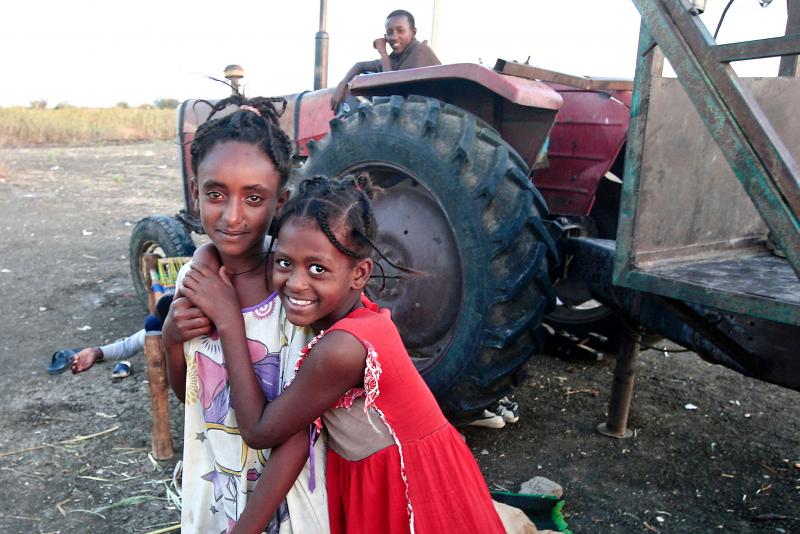Ethiopians who have escaped the intense fighting in their northern homeland of Tigray by fleeing into Sudan are safe, but the terrifying nightmare of what they witnessed continues to haunt them.
“I saw bodies dismembered by the explosions,” said Ganet Gazerdier, a 75-year-old sitting alone in the dust at eastern Sudan’s Um Raquba Refugee Camp, newly opened to cope with a sudden influx of more than 27,000 people fleeing airstrikes, artillery barrages and massacres in Ethiopia.
“Other bodies were rotting, lying on the road, murdered with a knife,” she added.

Photo: AFP
Distraught at having been forced to flee their homes, traumatized by becoming separated from family members in the mad rush and horrified after witnessing killings, refugees wander as if dazed in the camp.
“I lived with my three daughters,” said Gazerdier, dressed in a blue dress and white headscarf to protect her from the blazing sun. “When the shells started to rain down on our house, we all panicked and fled in the dark.”
The bombardment not only destroyed her house in Humera, the site of reportedly some of the heaviest fighting, but also separated her from her family.
Everyone scattered and she has yet to make contact with them.
She has found some help at the camp, 80km from the border, but conditions are rough, with only basic emergency relief set up.
For the Ethiopians who arrive, there is an initial sense of relief that they are safe.
However, for many, a sense of guilt soon kicks in, as they sit and wait in the hope that those they love might also turn up.
To escape, Messah Geidi split from his wife and four-year-old son — and he cannot forgive himself.
“I don’t know where they are, and if they are still alive,” he said.
Geidi comes from Mai-Kadra, where Amnesty International said last week that “scores, and likely hundreds, of people were stabbed or hacked to death.”
“I fled Mai-Kadra, because the army slaughtered the young people like sheep,” Geidi said.
The UN High Commissioner for Refugees (UNHCR) said that the border area faces an emergency.
“A full-scale humanitarian crisis is unfolding,” UNHCR spokesman Babar Baloch said, adding that about 4,000 people were fleeing across the frontier each day.

POLITICAL PRISONERS VS DEPORTEES: Venezuela’s prosecutor’s office slammed the call by El Salvador’s leader, accusing him of crimes against humanity Salvadoran President Nayib Bukele on Sunday proposed carrying out a prisoner swap with Venezuela, suggesting he would exchange Venezuelan deportees from the US his government has kept imprisoned for what he called “political prisoners” in Venezuela. In a post on X, directed at Venezuelan President Nicolas Maduro, Bukele listed off a number of family members of high-level opposition figures in Venezuela, journalists and activists detained during the South American government’s electoral crackdown last year. “The only reason they are imprisoned is for having opposed you and your electoral fraud,” he wrote to Maduro. “However, I want to propose a humanitarian agreement that

ECONOMIC WORRIES: The ruling PAP faces voters amid concerns that the city-state faces the possibility of a recession and job losses amid Washington’s tariffs Singapore yesterday finalized contestants for its general election on Saturday next week, with the ruling People’s Action Party (PAP) fielding 32 new candidates in the biggest refresh of the party that has ruled the city-state since independence in 1965. The move follows a pledge by Singaporean Prime Minister Lawrence Wong (黃循財), who took office last year and assumed the PAP leadership, to “bring in new blood, new ideas and new energy” to steer the country of 6 million people. His latest shake-up beats that of predecessors Lee Hsien Loong (李顯龍) and Goh Chok Tong (吳作棟), who replaced 24 and 11 politicians respectively

Young women standing idly around a park in Tokyo’s west suggest that a giant statue of Godzilla is not the only attraction for a record number of foreign tourists. Their faces lit by the cold glow of their phones, the women lining Okubo Park are evidence that sex tourism has developed as a dark flipside to the bustling Kabukicho nightlife district. Increasing numbers of foreign men are flocking to the area after seeing videos on social media. One of the women said that the area near Kabukicho, where Godzilla rumbles and belches smoke atop a cinema, has become a “real

‘WATER WARFARE’: A Pakistani official called India’s suspension of a 65-year-old treaty on the sharing of waters from the Indus River ‘a cowardly, illegal move’ Pakistan yesterday canceled visas for Indian nationals, closed its airspace for all Indian-owned or operated airlines, and suspended all trade with India, including to and from any third country. The retaliatory measures follow India’s decision to suspend visas for Pakistani nationals in the aftermath of a deadly attack by shooters in Kashmir that killed 26 people, mostly tourists. The rare attack on civilians shocked and outraged India and prompted calls for action against their country’s archenemy, Pakistan. New Delhi did not publicly produce evidence connecting the attack to its neighbor, but said it had “cross-border” links to Pakistan. Pakistan denied any connection to